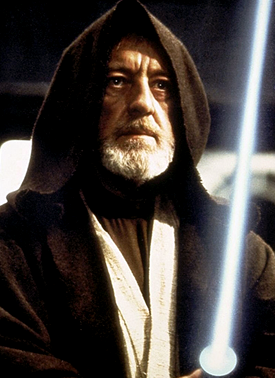 As much as science fiction looks to the future, it also of necessity looks to the past. And as much confidence as it places in the scientific method, it often turns to religion, simply because of the scope of the great cosmic questions that such stories inevitably pose.
As much as science fiction looks to the future, it also of necessity looks to the past. And as much confidence as it places in the scientific method, it often turns to religion, simply because of the scope of the great cosmic questions that such stories inevitably pose.
For these reasons, it should come as no surprise that the best science fiction stories often include knights and shamans, priests and warrior monks. Far from degrading our view of the future, they greatly enrich and humanize it, bringing a sense of meaning and destiny to an otherwise cold and lonely universe.
The best example of this is probably the Jedi from the original Star Wars trilogy. I still get shivers when I hear Yoda explain the force:
Size matters not. Look at me. Judge me by my size, do you? Hmm? Hmm. And well you should not. For my ally is the Force, and a powerful ally it is. Life creates it, makes it grow. Its energy surrounds us and binds us. Luminous beings are we, not this crude matter. You must feel the Force around you; here, between you, me, the tree, the rock, everywhere, yes. Even between the land and the ship.
There are plenty of other examples too, of course–harsh ones like the creeds the Cylons follow in the re-imagined Battlestar Galactica, which they use to justify their genocidal war against the humans. And then there are the quaint and simplistic ones that happen when a primitive race makes first contact with humanity … as well as the ones from a race so advanced that they make us look like barely evolved monkeys.
So why is religion so prominent in science fiction? Probably because the best science fiction stories act as a mirror that allows us to see ourselves better. Throughout history, religion has been one of the most important parts of any human civilization. Even the modern secular cultures still grasp at the same cosmic questions, striving to find meaning beyond the animal drives of food, sleep, and sex.
At its core, every religion is about telling a cosmic story. There’s a reason why the Bible starts with the words “in the beginning,” and why the first sura of the Qur’an names Allah “The Merciful and The Compassionate.” Since the best science fiction also tells a cosmic story, is it any surprise that there should be overlap between the two?
The best science fictional religions are the ones that make you want to believe. The Force in Star Wars was definitely like that to me (the original trilogy, of course–before all that midi-chlorian nonsense). Orson Scott Card’s philotic web also turned me into a believer, at least for the duration of those books. Even Eywa from the movie Avatar had some deep undertones that made me wish I was a part of that world.
Religion plays a huge role in my own books, not just the stuff that I believe in real life (though I’m sure that influences my writing), but the stuff that I think the characters would believe.
In Star Wanderers, for example, most of the outworlders are pagans who pray to the stars. In that universe, astrogation is an act of worship. The Deltans subscribe to a fusion of pagan and Christian beliefs, which in turn affects how much they value families and children. I won’t spoil it, since it comes as something of a reveal in Homeworld, but it definitely drives the series. And of course there’s Jeremiah’s New Earther background, with its guilt complex that leaves him emotionally scarred.
My favorite religion to write so far was the faith of the desert tribesmen in Desert Stars. I wrote that book just after spending a summer in the Middle East, and my experience of the Muslim culture definitely was a huge influence. The tribesmen pray to the Temple of a Thousand Stars, the temple erected to the memory of Earth soon after the first colonists made planetfall. The first half of the book follows Jalil’s pilgrimage to the ancient temple, through the domes filled with strange and decadent people.
When I started the Gaia Nova series, I wanted to create a science fictional universe where any of our real-world religions could still plausibly be true. The way I got around all the conflicting prophecies of the end times was to have a human colony mission leave Earth soon after our time. When the colonists woke up, they’d lost the location of Earth, so naturally all the religions developed around the idea that Earth had received its prophesied glorification and become a heavenly paradise.
That’s the short explanation, anyways. But the books themselves aren’t so much about that as they are about the characters. If religion is important to them, then that becomes an important part of their story. And since religion is so important to us here on Earth, I can’t help but believe that it will follow us to the stars.

Very interesting! I love science-fiction and your blog is a great discovery today. I’ll check out your books.
Interesting. I’d see a lot of the elements you’re talking about as magic or mystic rather than religion. Although I guess they do have religious elements. It’s hard to seperate the two in science fiction I think.
Rinelle Grey
Yeah, and there’s also a lot of overlap between religion and magic in fiction. It’s more common in fantasy (especially heroic fantasy), but often the priests are also mages in some way. I guess it makes sense, though: both religion and magic deal with things that are supernatural, or at least transcend the immanent sphere we currently live in.